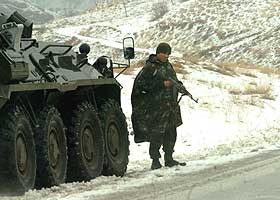
Friday, December 14, 2007 | ÜMİT ENGİNSOY WASHINGTON
Political solution, not military one, is desirable to eliminate PKK in both Turkey and Iraq, State Dept.'s counter-terrorism coordinator says

The United States wants a political solution, and not a military one, for the problem posed by the outlawed Kurdistan Workers' Party (PKK) inside both Turkey and Iraq, a senior U.S. official said Wednesday. Speaking at the Washington Institute for Near East Policy, a think tank here, Ambassador Dell Dailey, the State Department's coordinator for counter-terrorism,was asked if the PKK problem could be resolved militarily or if a political solution should be sought.
"We have not looked at a military solution as the solution to the PKK. Our preference is a political solution," Dailey said.Asked if his remarks were for the international problem caused by the PKK's presence in northern Iraq or for a solution in Turkey, he said: "both in Iraq and in Turkey."This was the first time a senior U.S. official in on-the-record remarks urged Turkey to find a political solution to its PKK problem, although Dailey did not elaborate on the elements of this political solution.He said that when the PKK abducted eight Turkish soldiers during a clash with the military in October, and later released them in northern Iraq, it was "political pressure, not military pressure" that worked.
Dailey's remarks come at a time when Prime Minister Recep Tayyip Erdoğan said some legal arrangements might be made to facilitate the return of some militants to their homes. The northern Iraq-based PKK has expanded the scope and tempo of attacks against Turkish targets this year, prompting Parliament to authorize the government in October to send the army into Iraqi territory to fight the terrorists there if or when deemed necessary.
While Washington says Turkey has the right to defend itself against the PKK terrorists, it opposes a unilateral military incursion, fearing that it could further destabilize Iraq. Instead, at an early November meeting at the White House with Erdoğan, U.S. President George W. Bush pledged to provide the Turkish military with actionable intelligence to hit specific PKK targets in limited operations.
"We're sharing intelligence with the Turks under the president's decision. My expectation is that that's in process and working," Dailey said. "We've shown a great diplomatic insight, acumen when we were able to get the Iraqi government, the Turkish government and the U.S. government together," he said."And then the Iraqi government agreed that the PKK is a terrorist organization.
That's a great leap forward, an important step for acceptance of the fact now the Iraqi government has a challenge to eliminate – through the systems that they think are appropriate – the PKK threat near its northern borders."Dailey recently became the State Department's coordinator for counter-terrorism after retiring as a lieutenant general from the U.S. Army, which he had served for 36 years. In his last job he was director of the Center for Special Operations at the U.S. Special Operations Command.
The topics of his remarks at the Washington Institute ranged from the wars in Iraq and Afghanistan to his support for a Saudi Arabian re-education program that treats terrorists as victims of a misguided ideology and not criminals to be jailed for life.
Dailey said the struggle against terrorism overall was not primarily a military task, emphasizing the importance of democracy promotion. He said he was sure that at some point either the United States or one of its allies would find and capture Osama bin Laden, leader of the al-Qaeda terrorist group.


